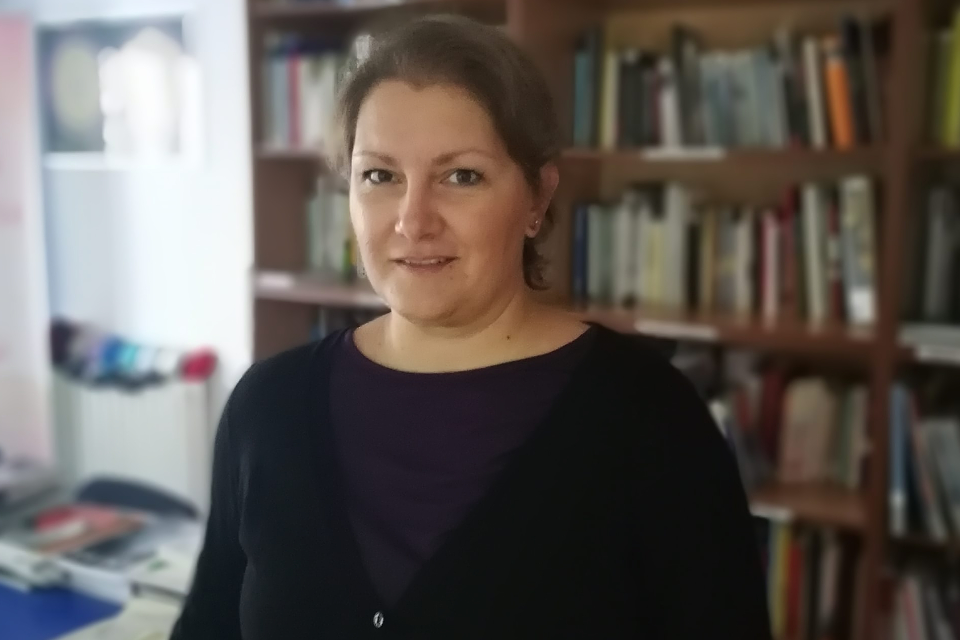Take Five: “It is crucial to strengthen the capacities of institutions to provide online support to women survivors of violence”
Date:

Sanja Ćopić is a researcher and President of the Executive Board of the Victimology Society of Serbia, which conducted the research “Actions of competent institutions and services for combating domestic violence in the Republic of Serbia during the COVID-19 pandemic, especially during the state of emergency" in May 2021. This research was part of the campaign #SOSagainstViolence conducted by non-governmental association Fenomena under UN Women programme on ending violence against women in the Western Balkans and Turkey “Implementing Norms, Changing Minds,” funded by the European Union. Ćopić spoke to UN Women about the main findings of the research, including the biggest challenges in the functioning of institutions and organizations that provide support to women survivors of violence.
How and to what extent have the pandemic and the state of emergency affected women survivors of violence?
As in other countries, the pandemic and restriction measures increased the risk of violence against women and girls, particularly domestic violence. Although domestic violence was prevalent, we have also recorded some new forms of violence against women during the COVID-19 pandemic. These manifested as attempts to establish greater control over women by keeping them in isolation, limiting their movement, limiting social contacts, economic violence and threatening to infect them with the virus by intentionally sneezing or coughing as a form of intimidation. On the other hand, women survivors of domestic violence have been faced with limited opportunities to seek assistance. During the state of emergency, it was much more difficult for women belonging to vulnerable groups to report violence and seek assistance, particularly women in rural settlements or those unable to use modern technologies and online communication channels.
How did the government respond to cases of domestic violence, in terms of the legal framework?
The Government of Serbia undertook numerous decisions and regulations on measures to be undertaken during the state of emergency, but they were not gender-sensitive. Specialized women’s organizations providing assistance and support to women victims of violence suggested to the Government to amend the document that set up measures during the state of emergency to enable women and girls to leave their homes and seek assistance in cases of violence during ‘police hour’ without being punished, but this change never happened.
How did the civil society organizations respond?
Specialized organizations provided support to women survivors over the telephone, and new online communication methods were also used. Social media, chat and email communication systems were developed to remain available to their beneficiaries regularly during the crisis. However, one of the perceived problems relates to the difficulties of reaching women that do not use digital technologies, who were unable to access these online information channels.
How were the programmes of support to women survivors of violence, such as the helpline, implemented and funded during the state of emergency?
In general, civil society organizations in Serbia providing support to women who experience violence do not get funding from the state, nor do they have stable funding sources, so the crisis due to the COVID-19 pandemic made the funding of their activities even more unstable and uncertain. Receiving funding from the local self-government budgets is rare. Some organizations had to cease or modify their activities, and part of them were funded by donor and project funds. For example, UN Women secured symbolic but still significant financial resources so that several organizations from the Women Against Violence Network could provide 24-hour support to women survivors via helplines, provide other forms of urgent assistance to the most vulnerable groups of women and cover other unforeseen costs.
What would be your recommendations to improve the work of government institutions in the area of preventing domestic violence, reporting perpetrators and enacting protection measures?
It is crucial to keep informing the public about the increased risk of violence against women and girls during the pandemic and other crises, and about existing services and support. To improve support and protection for women survivors of violence, it is important to work on strengthening institutional capacities to provide online support, as well as for the government to ensure adequate funding for all service providers, including civil society organizations. Finally, when it comes to reporting violence, measures of protection and prosecution of perpetrators, it seems to be key to design and introduce alternative ways and channels for reporting violence, enabling women to seek help timely and without a risk to their safety.